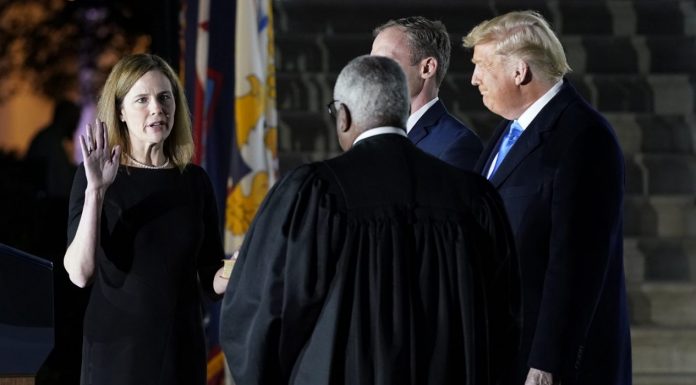(Headline USA) Amy Coney Barrett was confirmed to the Supreme Court late Monday by a deeply divided Senate, with Republicans overpowering Democrats to install President Donald Trump’s nominee days before the election and likely shifting the court in a conservative direction.
Trump’s choice to fill the vacancy of the late liberal icon Ruth Bader Ginsburg potentially opens a new era of rulings on abortion, the Affordable Care Act and even his own election. Democrats were unable to stop the outcome, Trump’s third justice on the court, as Republicans reshape the judiciary.
Barrett, 48, will be able to start work Tuesday, with her lifetime appointment as the 115th justice.
“This is a momentous day for America,” Trump said at a primetime swearing-in event on the South Lawn at the White House.
Justice Clarence Thomas administered the Constitutional Oath to Barrett before a crowd of about 200.
Barrett told those gathered that she believes “it is the job of a judge to resist her policy preferences.” She vowed, “I will do my job without any fear or favor.”
Monday’s vote was the closest high court confirmation ever to a presidential election, and the first in modern times with no support from the minority party. Vice President Mike Pence declined to preside at the Senate unless his tie-breaking vote was needed after Democrats asked him to stay away when his aides tested positive for COVID-19. The vote was 52-48, and Pence’s vote was not necessary.
“Voting to confirm this nominee should make every single senator proud,” said Senate Majority Leader Mitch McConnell, fending off “outlandish” criticism in a lengthy speech. During a rare weekend session he declared that Barrett’s opponents “won’t be able to do much about this for a long time to come” — that is, unless Democrats take full control of Congress and the presidency and pack the court with more justices.
Barrett, a federal appeals court judge from Indiana, is expected to take the judicial oath administered by Chief Justice John Roberts in a private ceremony Tuesday at the court to begin participating in proceedings.
Underscoring the political divide during the pandemic, the Republican senators sat in their seats as is tradition for landmark votes, and applauded the outcome, with fist-bumps. Democratic senators emptied their side, heeding party leadership’s advice to not linger in the chamber.
Democrats argued for weeks that the vote was being improperly rushed and insisted during an all-night Sunday session it should be up to the winner of the Nov. 3 election to name the nominee.
Speaking near midnight Sunday, Sen. Elizabeth Warren, D-Mass., called the vote “illegitimate” and “the last gasp of a desperate party.”
Several matters are awaiting decision just a week before Election Day, and Barrett could be a decisive vote in Republican appeals of orders extending the deadlines for absentee ballots in North Carolina and Pennsylvania.
The justices also are weighing Trump’s emergency plea for the court to prevent the Manhattan District Attorney from acquiring his tax returns. And on Nov. 10, the court is expected to hear the Trump-backed challenge to the Obama-era Affordable Care Act. Just before the Senate voted, the court sided with Republicans in refusing to extend the deadline for absentee ballots in Wisconsin.
Trump has said he wanted to swiftly install a ninth justice to resolve election disputes and is hopeful the justices will end the health law known as “Obamacare.”
In a statement, Democratic presidential candidate Joe Biden tied Barrett’s nomination to the court to the Republican effort to pull down the Affordable Care Act. He called her confirmation “rushed and unprecedented” and a stark reminder to Americans that “your vote matters.”
Republicans are taking a political plunge days from the Nov. 3 election with the presidency and their Senate majority at stake.
Only one Republican — Sen. Susan Collins, who is in a tight reelection fight in Maine — voted against the nominee, not over any direct assessment of Barrett. Rather, Collins said, “I do not think it is fair nor consistent to have a Senate confirmation vote prior to the election.”
Most other Republicans facing tough races embraced the nominee who clerked for the late Scalia to bolster their standing with conservatives. Sen. Thom Tillis, R-N.C., said in a speech Monday that Barrett will “go down in history as one of the great justices.”
Democrats were unified against Barrett. While two Democratic senators voted to confirm Barrett in 2017 after Trump nominated the Notre Dame Law School professor to the appellate court, none voted to confirm her to the high court.
In a display of party priorities, California Sen. Kamala Harris, the Democratic vice presidential nominee, returned to Washington from the campaign trail to join colleagues with a no vote.
No other Supreme Court justice has been confirmed on a recorded vote with no support from the minority party in at least 150 years, according to information provided by the Senate Historical Office.
Adapted from reporting by Associated Press.

